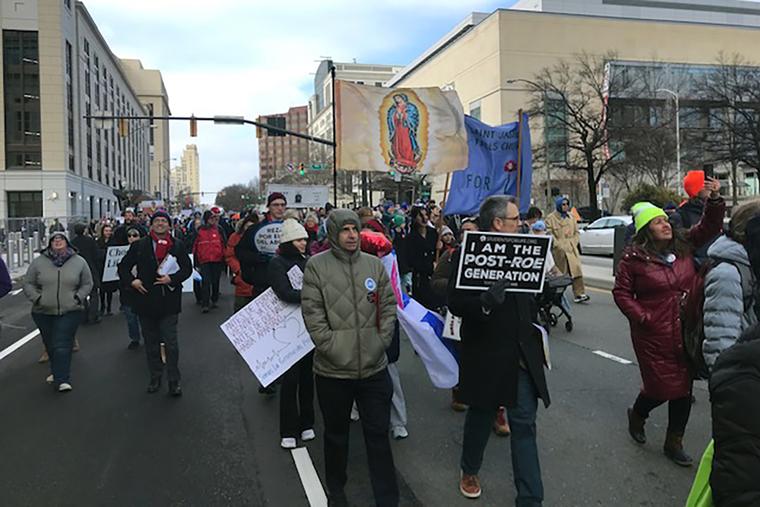Virginia Pro-Lifers March for Life in Richmond
Pro-lifers from across the Commonwealth joined in the Virginia State March for Life, held Feb. 1 in Richmond.

The centerpiece of the March was a rally in the park adjacent to the State Capitol building. Addressing the crowd, Virginia Attorney General Jason Miyares spoke of the “bravery” of a cousin who, during his college years, confided to him that she was pregnant. Committed to protect the life of her child, she also decided to allow her boy, Nathan, to be adopted by a family who could better provide for him. When his sister later died of breast cancer, Miyares recounted that a young man tapped him on the shoulder at her funeral, introducing himself, “Hi, I’m Nathan.” The boy was at Miyares’ swearing-in as Attorney General in 2022.
Other speakers addressed the personal dilemmas they faced after having had abortions. Arlington Catholic Bishop Michael Burbidge, chair of the U.S. Conference of Catholic Bishops’ Pro-Life Committee, concluded the rally along with Richmond Bishop Barry Knestout.
Following the rally, the assembled crowd marched peacefully around cordoned-off streets surrounding the Capitol complex.
Arriving buses gathered at the Richmond Convention Center at 8:30am, where attendees received a briefing on five bills pro-life Virginia was prioritizing in the General Assembly, the state’s legislature. Marchers then made their way en masse to Capitol offices to meet as groups with their state senators and delegates. The presence of pro-lifers in the Senate Gallery was acknowledged by Sen. George Barker (D-Fairfax) and Republican Lieutenant Governor Winsome Sears when the upper chamber convened at noon.
Little pro-life legislation is expected from the current General Assembly, where Democrats control the Senate 22-17 (one additional independent caucuses with the Republicans) and Republicans the House of Delegates 52-48. Movement on prolife legislation was stymied last week in the Senate. Sen. Louise Lucas (D-Portsmouth), chair of the Senate Education and Health Committee, vowed “as long as Democrats have our Senate majority, the brick wall will stand strong” against prolife bills.
Both parties are positioning themselves ahead of state legislative elections this November, which Virginia (and New Jersey) hold in off-years. Virginia’s legislature is holding a short but intensive legislative session this year, which began Jan. 11 and ends Feb. 25, with a possible additional sitting on April 12.
Among the bills the March prioritizes are:
- Adoption of federal Hyde Amendment norms in Virginia. Virginia’s budget goes beyond the federal Hyde Amendment by allowing state funds to pay for abortions of unborn children who might be born with disabilities. Governor Glenn Youngkin’s budget proposes eliminating that exception and mirroring state restrictions to follow the federal Hyde Amendment’s exceptions for danger to maternal life, rape and incest.
- A “Born Alive Abortion Survivors Protection Act” to ensure medical attention and treatment for any child born alive in the course of a late-term abortion.
- A “Women’s Right to Know Act,” which would restore the state’s informed consent requirements for abortion (including abortion contraindications) that was repealed when Democrats took control of the General Assembly in 2020.
- An “Assistance for Pregnant Women” Act that directs the State to develop a comprehensive database of all resources, including crisis pregnancy centers and assistance for carrying a child to term, to be made available to mothers.
- Rejection of a “Right to Abortion” Amendment. Proposals have been introduced to insert a “right to abortion” amendment into the Virginia Constitution, with some interest expressed on by pro-abortion legislators to attempt votes in the current session — where it would likely fail at least in the House of Delegates — to put members on record for use as a campaign issue. Virginia state constitutional amendments requires passage by a majority of the Senate and House of Delegates in two legislatures with at an election to the House of Delegates occurring between them. If adopted, the amendment is then submitted to public referendum.
The National March for Life is encouraging participation in state marches in the wake of the Dobbs reversal of Roe v. Wade. Just as Roe caught pro-lifers flat-footed in 1973, when no national right to life structures existed, so Dobbs’ sending abortion policy back to the states has forced the reinvigoration of state-level prolife activity. Upcoming Marches are planned for Feb. 23 (Arizona), March 6 (California), March 22 (Connecticut), Sept. 19 (Pennsylvania) and Oct. 6 (Ohio). National March for Life President Jeanne Mancini hopes to have marches organized in every state within three-to-five years. For updates, see here.
- Keywords:
- prolife2023
- pro-life
- abortion
















